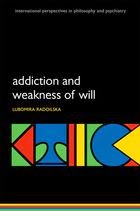 |
| Addiction and Weakness of Will By Lubomira Radoilska |
In particular, the proposed integrated account is grounded in a general theory of responsibility and a related model of action as actualisation bringing together insights from both volitional and non-volitional conceptions, such as the intuition that it is unfair to hold a person responsible for things that are not up to her and the parity of actions and attitudes as legitimate objects of moral appraisal. Furthermore, the actualisation model supports a distinctive version of the Guise of the Good thesis which links valuing and intending in terms of success in action and explains why akratic actions and their offspring – addiction and weakness of will – are necessarily less than successful yet fully responsible.
The book comprises five chapters. In the first chapter, I critically explore the implications that understanding responsibility in terms of voluntary control has for conceptualising agency in the context of addiction. I argue that this volitional conception is unsatisfactory in general and ultimately misleading with respect to addiction.
In chapter two, I look into an alternative, non-volitional conception where the basic responsibility condition is not voluntary control but evaluative judgement. Looking at pleasure in the portraits of addiction by De Quincey and Dostoevsky, I argue that the non-volitional focus on evaluative stance is an insight worth keeping. However, I also raise the question of whether responsibility can be consistently conceptualised without a notion of agential control.
In chapter three, I consider a different kind of non-volitional conception that could support an affirmative answer: a quality-of-will based account. I argue that this conception is unpersuasive.
In chapter four, I explore the relationship between akrasia and ordinary weakness of will. The former is defined as acting against one’s better judgement, the latter as acting against one’s prior intention. Drawing on my earlier work on Aristotle’s philosophy of action, I argue that the classical conception of akrasia captures the more fundamental phenomenon.
In the final chapter, I offer an integrated account of addiction and weakness of will. Like weakness of will, addiction is a secondary failure of intentional agency, which derives from akrasia. However, unlike weakness of will, addiction is a form of akrasia that becomes recalcitrant in virtue of being devoid of pleasure. Paradoxically, this is what accounts for the sense of compulsion typically associated with addiction, but not weakness of will. This integrated account is grounded in a general, Aristotelian theory of responsible agency bringing together insights from both volitional and non-volitional conceptions.